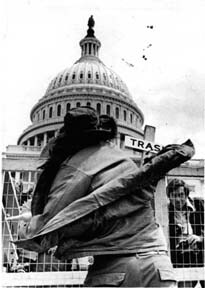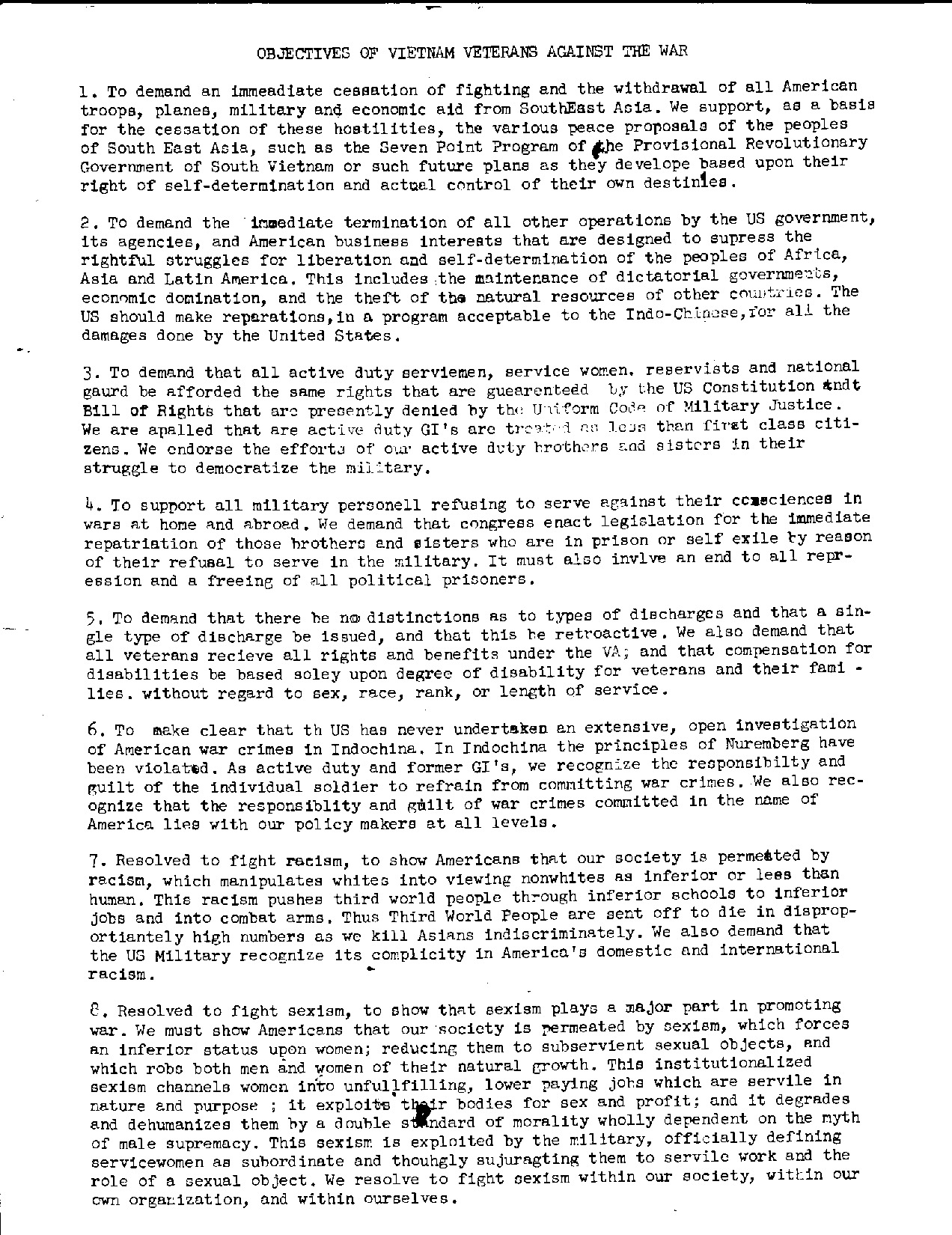Role of Veterans
"You don't see that today. You don't see a cause that makes that many people come together." -Bruce Boedtker
A Concrete Target:
After discharge, many soldiers found it jarring to re-enter civilian life. Bruce felt the effects of the antiwar sentiment on the homefront aimed at veterans coming home. He described the veterans as a physical manifestation of the war at which people could (and did) vent their displeasure. Unlike the political leaders hidden in Washington, veterans were a concrete target for people to focus their anger, preventing them from receiving the respect they deserved. Bruce remembers trying to hide his veteran status, saying that he "grew [his] hair out as quick as [he] could" to avoid the military appearance.
In his oral history, Glen R. Kendall, who served with the U.S. Army as part of the 196th Light Infantry Brigade, describes experiencing a similar disdain for the military upon arriving home. He experienced people shouting at him and telling him he was wrong, lamenting how the war tore society apart. Kendall also discusses the ways in which the war physically and mentally impacted his life and the failures of the Veterans Association (VA) to respond to the needs of veterans. He discusses his struggles with Post Traumatic Stress Disorder (PTSD), including recurring nightmares of his time in combat and the general anger he felt. He also discusses the health impacts he and others faced because of the use of the toxin Agent Orange as a defoliant. He notes that the VA did not handle either appropriately. Kendall felt that unlike in other wars, "our country let our soldiers down."
As seen in both of these men's stories, the attitudes of civilians towards the military, and likely the unpopularity and trauma of the war, has created a collective memory of abuse and the motif of the mistreated veteran.
Vietnam Veterans Against the War:
The Vietnam Veterans Against the War (VVAW) transferred the antiwar efforts of the military to the homefront. The war was generally unpopular among veterans returning home. A 1969 study cited in Penny Lewis's Hardhats, Hippies, and Hawks, found that 10% of veterans questioned supported the purpose and tactics of the war they left. Of those who did not, 44% said the war was a mistake and 40% said it was fought the wrong way. The VVAW captured this energy and used it to bridge the gap between the military antiwar movement and the movement among the general public. Founded in 1967, the movement rose to 30,000 active members by the time the war ended.
In its onset, the organization's moderate stance reflected its distrust of the radicalized counterculture movement. In 1968, the VVAW lobbied for the election of Eugene McCarthy and the objective of ending the war within the Democratic Party. However the group shifted in the political context of the 1970s. Their best-remembered protest took place during this time in April, 1971 with the events of Dewey Canyon III. Members marched on Washington where they camped on the Washington Mall, gave speeches, and symbolically hurled medals and other war memorabilia at the Capitol to signify their rejection of the war and the lack of authority in the institutions behind it.
The VVAW movement was concerned with addressing issues veterans faced. Their objectives (right) show a commitment to an immediate end of the war, withdrawal of all troops, and discontinuation of U.S. involvement in Southeast Asia. They also demonstrate the domestic goals of protecting veterans' rights and addressing societal issues such as racism and sexism. To achieve these objectives, the movement protested the conditions of veterans' hospitals, homelessness, and unemployment. They exposed war atrocities with the Winter Soldier Investigation (December, 1971) and formed support groups for those suffering from PTSD. Because of their tactics, they generally did not experience the same conflicts with police and authorities that other movements faced. They became an influential group that effectively lobbied for peace and veterans' rights.
Legacy:
Some of the most valuable aspects of history are the lessons we take away from it. In remembering the Vietnam War, those who served play a vital role in shaping and preserving its legacy.
For Glenn Kendall, the Vietnam War should remind us to be cautious of our justifications for war. He believes that the United States must be more cautious in terms of where it sends troops and exerts its resources. Kendall would like the military to re-evaluate its strategy: to focus on winning the hearts and minds of the enemy rather than resorting to unnecessary violence.
Like Kendall, Douglas Shivers urges the United States to be cautious before entering a war. Nevertheless, he believes there are times we must fight to avoid caving to evil.
Robert Watters hopes for honesty. He believes that when the United States can confront the truth about the war and how it was fought, it can begin to confront the repercussions of the war and its negative impact on society.
Bruce Boedtker shows how the power of a movement, in his case a movement of "young people," can leave a lasting impact on society.

